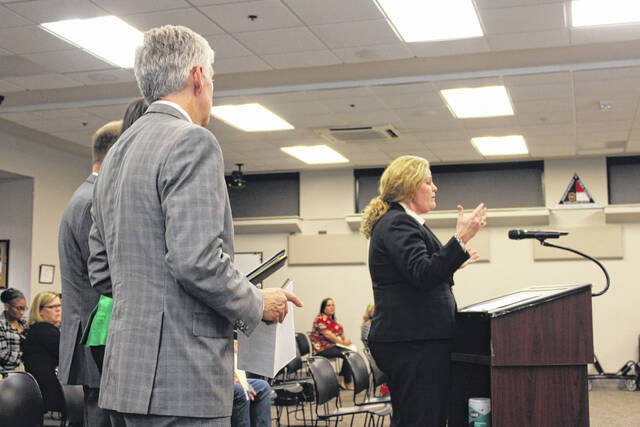
Chief District Court Judge Amy Wilson discuss plans to establish a Family Treatment Court Monday during the Scotland County Board of Commissioners regular business meeting.
Tomeka Sinclair | The Laurinburg Exchange
LAURINBURG — District judges representing Scotland, Anson and Richmond counties, and the Scotland County Department of Social Services attorney pitched on Monday their plan to establish Judicial District 16A’s first Family Treatment Court in Scotland County.
“We’re to the point now where we think we’re ready to take a step,” said Chief District Court Judge Amy Wilson, of Richmond County.
But, they need more than $300,000 to get it off the ground, Scotland County Department of Social Services Attorney Brandi Jones Bullock told Scotland County Commissioners on Monday.
The plan is to model the Family Treatment Court after Robeson County’s but to also individualize it to meet Scotland County’s needs, according to District Court Judge Chris Rhue. Robeson and Cumberland counties are nearby counties with a Family Treatment Court program.
“In our area, there’s a really big space where there’s not any (Family Treatment Courts) and we certainly want to bring this to Scotland County,” Wilson said.
Establishing the court has been in the making for the past three years, according to Wilson. Judges in the judicial district unilaterally came up with the decision to have Scotland pilot the initiative.
The court will serve as a parallel to the county’s DSS Courts, with the goal of working with parent(s) or guardian(s) who are in danger of losing custody of their children due to abuse or neglect charges.
“Once the parents or parents come before the DSS court with a petition, they will go through adjudication and their child will be adjudicated abused, neglected or dependent. At the same time we, the court system or DSS will look at that parent to determine what are their issues. Do they Have substance abuse issues? Do we believe they can be reunified with this child? If so, they’ll be a good candidate for Family Treatment Court,” Bullock said.
While the court is meant to support families, Wilson emphasized that the court will also be disciplinary.
“As part of the handholding and as part of the incentives, there is also very much a tough love kind of component in that they have to consent into being in this program and if they do not do what they’re supposed to do, they could be placed in jail … We temper justice with mercy,” Wilson said.
If modeled after Robeson, the Family Treatment Court would be every two weeks.
“DSS court, not so much. It could be that they go to court every 60 days, 90, possibly every six months but Family Treatment Court is an ongoing every two-week process,” Bullock said.
That is the reason, the judges emphasized, that the court is needed.
“Why Family Treatment Court? It brings that permanence a lot quicker. We have a lot more services in place for the parents and we give them a chance to either reunite or not and if they can’t we move on,” Wilson said.
“What’s different here is the issue of time,” Rhue added. “How long does it take to get them back into court to face consequences if they’ve fallen off the train?”
Rhue said the difference is addressing an issue within weeks as opposed to months which will result in a more successful outcome.
“Now some people inevitably won’t and some people inevitably will and we have to be hopeful of the people that will make it,” Rhue said.
District Court Judge Sofia Gatewood Crawford, of Anson County, appealed to the hearts of the commissioners.
“If we don’t have a good foundation with our families, all these trouble you see in these big cities, it’s coming this way … Let’s start with a foundation and bridge the gap that we’re not able to bridge now,” Crawford said. “It’ll make a difference in our children’s lives, our lives and generations to come.”
Commissioners decided to wait until December to figure out if using Opioid Settlement funding is a possibility. County Manager April Snead emphasized that the county has to factor in the fact that the funding can only address needs in relation to drugs that are considered opioids.
Whether or not the county decides to fund the court, Wilson said the county would potentially save money with the reduction of children placed in foster care and incarceration.
“We know that substance abuse is a major part of this … That’s why we’re here. We don’t really stand to benefit from this. What we’re trying to do is make a difference. I know that sounds cliche but we really are just trying to do what we can for the children and the families of Scotland County,” Wilson said.
Tomeka Sinclair can be reached at tsinclair@laurinburgexchange.com .
